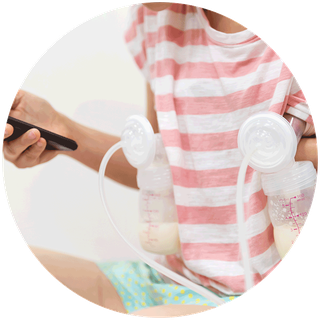- Expressing breast milk
- Expressing by hand
- Expressing with a pump
- Feeding advice
- Storing breast milk
- Hints, tips and more help
Hints, tips and more help
When it comes to expressing, being relaxed and comfortable is the key.
Here you'll find some more guidance on expressing your breast milk.
Tips to help you express
Get comfortable
Ideally you'll be able to express your breast milk in a warm, quiet room away from any noise or distraction. But this is not always possible – you may be at work or out and about in a public place.
If you're away from home, try to plan ahead and be close to a private, lockable room when you need to express.
Relax (as much as possible)
Some mums find sitting near their baby, looking at a photo or video clip, or holding an item of their clothing (so you can smell them) helps with relaxation, which then helps with milk flow. It's also a lovely reminder of why you're expressing and how beneficial your breast milk is.
If your baby is poorly and in hospital, it's not easy to relax.
If possible, try not to worry about how much breast milk you're producing – it may help to distract yourself by reading a book, listening to music or watching TV.
Try not to rush
When you're feeling rushed, it's harder to get your milk to flow. Set aside enough time so that you do not feel pressured.
You may find that there's a certain time of day you prefer to express your milk – it's all about figuring out what works best for you.
Everyone's different, but when you first start expressing, try allowing at least 30 to 45 minutes per session. Once you've got the hang of it, it'll probably take you around 15 to 20 minutes to empty both breasts.

Warming breast milk
Do
-
warm milk up by holding it under warm running water, or by sitting it in a jug of warm water
-
use warmed-up breast milk within an hour
-
discard any leftover milk that's been warmed
Don’t
-
do not warm or defrost breast milk in a microwave – doing so can cause hot spots that can burn your baby's mouth
-
do not keep any leftover milk after a feed – discard it
Feeding your newborn
You can feed your newborn baby with your expressed milk in a bottle, syringe, spoon or special feeding cup. If you use a syringe, remove all caps or covers before feeding as they may cause your baby to choke if swallowed.
If you're feeding your baby in hospital, your midwife will be able to give you some help and guidance. If you're at home, your health visitor will be able to help.
Expressing milk if your baby is premature
If your baby is too small or poorly to breastfeed, it's important to start expressing as soon as possible.
Your breast milk is packed with goodness, easier to digest than first infant formula, contains vital antibodies to protect them from infections, and contains nutrients to help with growth and development.
Aim to express 8 to 12 times within 24 hours (including once at night). Your midwife and the hospital staff can guide and support you – there may be a lactation (breastfeeding) specialist at the hospital.
Once your milk is flowing, you can start using a breast pump if you prefer.
When you first start expressing, you may only manage to get a few drops out – don't worry, these drops are extremely valuable to your baby. It can be a very stressful time – be patient with yourself and keep trying.
The baby charity Tommy's has advice on feeding your premature baby.

Breastfeeding Friend from Start for Life
The Breastfeeding Friend, a digital tool from Start for Life, has lots of useful information and expert advice to share with you – and because it's a digital tool, you can access it 24/7.
National Breastfeeding Helpline
For confidential breastfeeding information and support, call the National Breastfeeding Helpline on 0300 100 0212.
Lines are open 24 hours a day, every day of the year.